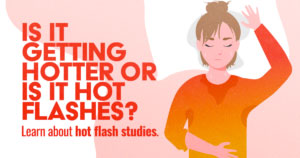Tips on Managing Hot Flashes

Hot flashes are a symptom of menopause that can last for many years. Scientists believe they result from changes in the body’s temperature regulation center of the brain. Hot flashes can vary in severity and can happen day or night. There are a lot of tips on managing hot flashes out there on the internet. Most involve healthier lifestyle changes and medication options if necessary. We’ve done some of the legwork with a summary below.
Lifestyle Changes for Hot Flashes
Not all women have hot flashes symptoms that warrant treatment. At the same time, some women experience symptoms severe and often enough to impact their daily lives. Specific lifestyle changes can help reduce hot flash symptoms and manage them better. Below are some tips you can try:
- Avoid warm rooms, hot drinks, hot foods, alcohol, caffeine, and cigarette smoking. These can all trigger hot flashes.

- Wear layers of clothing made from light, breathable fabrics, removing a layer or two when you’re hot and replacing them when you’re cooler.
- Regular physical activity helps reduce stress and promotes restful sleep. Meditation, yoga, tai chi, acupuncture, or massage are other effective stress management techniques.
- Keep cool at night with a bedside fan. Sip cool water if you wake at night. If you have trouble getting back to sleep, try meditation, paced respiration, or getting out of bed and reading until you become sleepy.
- Maintaining a healthy weight improves your overall health and lessens hot flash frequency.
Taking Medication for Your Hot Flashes May Help Too.
For hot flashes that persist despite these lifestyle changes, medication may help too. Estrogen hormone therapy is the most effective treatment for relieving hot flashes and night sweats. Other non-hormonal medications may help with hot flashes, such as:
- Antidepressants
- An antiseizure and nerve pain medication called gabapentin
- A blood pressure medication called clonidine
- Medications that are sometimes used in breast cancer treatment, such as tamoxifen.

Your ob-gyn can help determine which options are suitable for you. The good news is that more potential new hot flash therapies are being evaluated in clinical research studies here at Wake Research. Study volunteers gain potential access to new treatments and play a direct role in advancing care options for hot flashes.
Sources:


